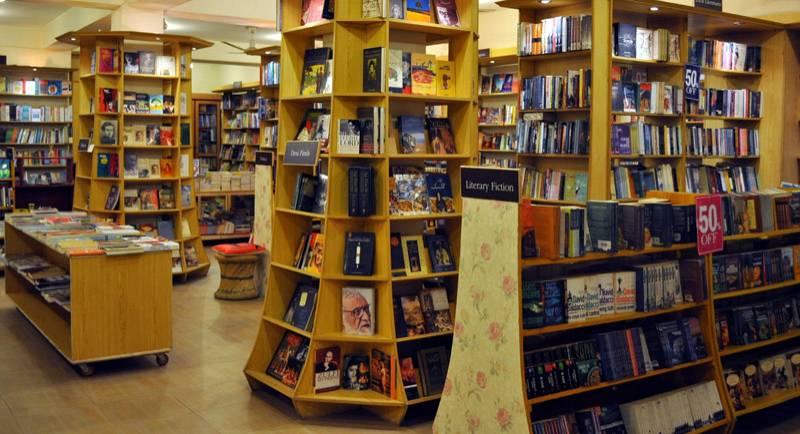
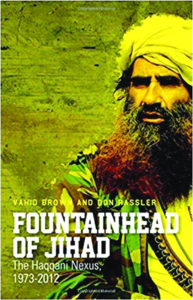
Fountainhead of Jihad: The Haqqani Nexus, 1973-2012
Vahid Brown, Don Rassler
Hurst Publishers (2013)
Drawing upon a wealth of previously unresearched primary sources in many languages, the authors shed much new light on a group frequently described as the most lethal actor in the current Afghan insurgency, and shown here to have been for decades at the centre of a nexus of transnational Islamist militancy, fostering the development of jihadi organisations from Southeast Asia to East Africa. Addressing the abundant new evidence documenting the Haqqani network’s pivotal role in the birth and evolution of the global jihadi movement, the book also represents a significant advance in our knowledge of the history of al-Qaeda, fundamentally altering the picture painted by the existing literature on the subject.
Vahid Brown is a specialist in the history of Islamist militancy and the author of Cracks in the Foundation: Leadership Schisms in al-Qa’ida, 1989-2006. He is also a PhD student at Princeton University.
Don Rassler is an instructor in the Department of Social Sciences and director of the Harmony Research Program at the Combating Terrorism Center at the United States Military Academy at West Point.
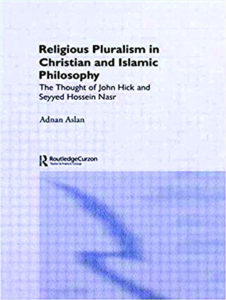
Religious Pluralism in Christian and Islamic Philosophy: The Thought of John Hick and Seyyed Hossein Nasr
Adnan Aslan
Psychology Press (1998)
The philosophy of religion and theology are related to the culture in which they have developed. These disciplines provide a source of values and vision to the cultures of which they are part, while at the same time they are delimited and defined by their cultures.
This book compares the ideas of two contemporary philosophers, John Hick and Seyyed Hossein Nasr, on the issues of religion, religions, the concept of the ultimate reality, and the notion of sacred knowledge.
On a broader level, it compares two world-views: the one formed by Western Christian culture, which is religious in intention but secular in essence; the other Islamic, formed through the assimilation of traditional wisdom, which is turned against the norms of secular culture and is thus religious both in intention and essence.
Adnan Aslan is a chair of the research at the Department of Education at the University of Vienna.
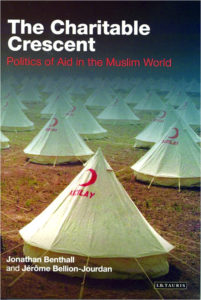
Charitable Crescent: Politics of Aid in the Muslim World
Jonathan Benthall, Jerome Bellion-Jourdan
I.B.Tauris (2003)
Islamic Charity Under Suspicion’: such headlines have become familiar since the attacks on the United States on 9.11. The Charitable Crescent is a unique and original account of a hitherto little-known field of pivotal significance to our understanding of the Muslim world today: the relationship between politics and philanthropy in the workings of Islamic charities. Based on years of research, Jonathan Benthall and Jerome Bellion-Jourdan explain the long tradition of philanthropy in Muslim history and how it is constantly adapted to differing political contexts. The pervasive connections between charity and politics in the Middle East demonstrate how naïve it is to think of humanitarianism as a sphere distinct from politics. The Charitable Crescent covers all aspects of this topic that has become so relevant in today’s world: who is entitled to benefit from Muslim alms? Can material relief aid be de-linked from political, or sometimes even violent, action? How can public trust (both Western and Islamic) in welfare delivery systems be won? Who is entitled to interpret Islamic doctrine? Is there one universal tradition of humanitarianism, or many traditions defined by cultural history? This book offers rich practical insights highly relevant to today’s highly tense international climate, and also encourages the reader to challenge the common Western assumption that ‘we’ are the exclusive providers of aid to rescue a passive Third World. “Interesting, rewarding and timely - this is an important book” - ‘Caroline Moorhead.’
Jonathan Benthall is the former Director of the Royal Anthropological Institute, editor of “Anthropology Today,” and author of “Disasters, Relief and the Medi”a. He is currently an Honorary Research Fellow in the Department of Anthropology, University College London, and former Chair of the International NGO Training and Research Centre, Oxford.
Jerome Bellion-Jourdan has a doctorate in Political Science from the Institut d’Etudes Politiques, Paris, and has been a research fellow at the Centre for International Studies and Research, Paris, and is a lecturer at Cairo University.
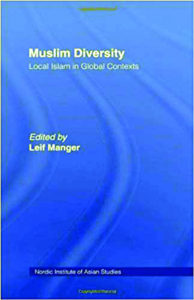
Muslim Diversity: Local Islam in Global Contexts
Leif Manger
Routledge (2014)
The term ‘local Islam’ has been coined to describe local responses to the effects of globalisation in the Islamic world. All contributions to this volume present cases of ‘local Islam’ as well as discussing the term itself. But what all of this group of anthropologists and historians convey is a feeling of dissatisfaction with the very term. Their uneasiness relates to the conceptual problems arising from seeing Islam as either local or global. Rather, the authors argue in favour of a focus not on Islam but on the lives of Muslims, putting their lives into the context of complex historical developments. Ranging across much of the vast extent of the Islamic world - from West Africa and the Near East to China and Southeast Asia - the contributions deal with the effects of migration on local Islamic traditions in Bangladesh; conflicts between Muslim sects in Pakistan; the development of jihad in West Africa; the problem of maintaining a Muslim identity in China; how Javanese Muslims combine their Islamic faith with belief in a local Javanese spirit world; the comparison between urban- and rural-based Islam in Syria; and (in two studies from western Sudan) issues of belief and broader aspects of identity management in a multi-ethnic situation.
Leif Manger is professor in the Department of Social Anthropology at the University of Bergen. Manger was the head of the Department from 1999-2001.
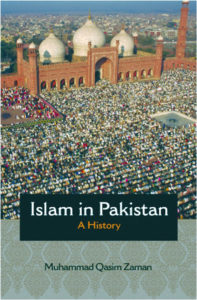
Islam in Pakistan: A History Muhammad Qasim Zaman
Princeton University Press (2018)
The first modern state to be founded in the name of Islam, Pakistan was the largest Muslim country in the world at the time of its establishment in 1947. Today it is the second-most populous, after Indonesia. Islam in Pakistan is the first comprehensive book to explore Islam’s evolution in this region over the past century and a half, from the British colonial era to the present day. Muhammad Qasim Zaman presents a rich historical account of this major Muslim nation, insights into the rise and gradual decline of Islamic modernist thought in the South Asian region, and an understanding of how Islam has fared in the contemporary world.
Much attention has been given to Pakistan’s role in sustaining the Afghan struggle against the Soviet occupation in the 1980s, in the growth of the Taliban in the 1990s, and in the War on Terror after 9/11. But as Zaman shows, the nation’s significance in matters relating to Islam has much deeper roots. Since the late nineteenth century, South Asia has witnessed important initiatives toward rethinking core Islamic texts and traditions in the interest of their compatibility with the imperatives of modern life. Traditionalist scholars and their institutions, too, have had a prominent presence in the region, as have Islamism and Sufism. Pakistan did not merely inherit these and other aspects of Islam. Rather, it has been and remains a site of intense contestation over Islam’s public place, meaning, and interpretation.
Examining how facets of Islam have been pivotal in Pakistani history, Islam in Pakistan offers sweeping perspectives on what constitutes an Islamic state.
Muhammad Qasim Zaman is the Robert H. Niehaus ‘77 Professor of Near Eastern Studies and Religion at Princeton University. His books include The Ulamain Contemporary Islam (Princeton) and Modern Islamic Thought in a Radical Age.

